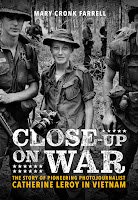

It's
Marvelous Middle Grade Monday
at
at
and #IMWAYR day
at
and
Farrell, Mary Cronk. Close-Up on War: The Story of Pioneering Photojournalist Catherine Leroy in Vietnam
March 22nd 2022 by Amulet BooksE ARC provided by Edelweiss Plus
At the age of 21, Leroy set out with just a camera, limited English language skills, and a desire to document the Vietnam Conflict. As a free lance photographer not affiliated with a major publication, she only got paid for photographs that she was able to sell. After photographing a USO tour with the entertained Ann-Margret, she managed to get permission to join the 101st Airborne Division on patrol of South Vietnam. She managed to get attached to the First Calvary, since she was interested in documenting the battlefields. This was difficult, since she was very tiny, and had to carry all of her equipment and manage to survive. Conditions in Vietnam were brutal, and she would often be in the field for over a month, with no chance to even change clothing. She managed to get her photographs into Life magazine, and was constantly looking for other outlets for her work. She even managed to be allowed to jump from a plane, and was one of the few journalists ever allowed to do this. Once her photographs started to gain interest, she even wrote a few articles for publications like the London Times. At every turn, she had to fight discrimination that she faced just for being a woman, but she didn't give up. She was injured badly when she was attached to Golf Company, and spent time in the hospital with a fractured jaw and other wounds from shrapnel. In 1968, she won the George Polk Award for news photography, but after three years in Vietnam was suffering from shell shock. She continued to work in the field of photojournalism, and was offered a contract by Time magazine in 1977. She covered an array of world events, such as the 1979 Iranian revolution and the civil was in Lebanon. In 2006, she was diagnosed with cancer and passed away very shortly after.
Strengths: There are not as many books about Vietnam as my students want to read, and this is a different view of this historical place and time. While there is plenty of military action, there's also a good story of female empowerment, and an interesting look at freelance journalism. The world was certainly not ready for Leroy to head off to war; she had to have a uniform tailored to fit her 5' frame, and had to wear boots that were too big, but she never gave up. This is a great message for young readers, and I always love to see biographies of people unknown to me.
Weaknesses: While it's interesting that Farrell was inspired to write this biography because of Leroys' letters, which are excerpted here, it was strange how quotidianal they were. Some of them sounded like she was in Saigon for a semester abroad, with requests for items of clothing and supplies. On the one hand, it did add a humanizing aspect to the book, but excerpts more related to the war might have made more sense, if they even existed.
What I really think: Farrell does such a great job of highlighting little known historical facets involving women with books such as Standing Up Against Hate, Fannie Never Flinched, and Pure Grit. This is a great addition to books about Vietnam like Partridge's Boots on the Ground, Townley's Captured, and Freedman's Vietnam.
Weaknesses: While it's interesting that Farrell was inspired to write this biography because of Leroys' letters, which are excerpted here, it was strange how quotidianal they were. Some of them sounded like she was in Saigon for a semester abroad, with requests for items of clothing and supplies. On the one hand, it did add a humanizing aspect to the book, but excerpts more related to the war might have made more sense, if they even existed.
What I really think: Farrell does such a great job of highlighting little known historical facets involving women with books such as Standing Up Against Hate, Fannie Never Flinched, and Pure Grit. This is a great addition to books about Vietnam like Partridge's Boots on the Ground, Townley's Captured, and Freedman's Vietnam.
Walsh, Jenni. Over and Out
March 1st 2022 by Scholastic Press
E ARC provided by Edelweiss Plus
Sophie was born on the same day that the Berlin Wall went up-- August 13, 1961. Living in East Berlin with her single mother (who doesn't talk about her father) is all she has ever known. Her mother, who had polio as a child and uses a wheelchair after her conditioned worsened when Sophie was small, has a job in a research lab where she is able to sit down, and their apartment has an elevator she can use most of the time. (Although there is also a paternoster, which looks terrifying, especially with a wheelchair!) Sophie knows that because her mother has a more academic job, she herself will probably have to work in a factory, so the family isn't too "bourgeoisie". She and her friend Katrina are very interested in science and invention, and spend a lot of time scouring the trash for recyclables but also things they can use to create devices. This is a little unusual for 1974, but after the girls find some books hidden in the floorboards that discuss women inventors, they are even firmer in their resolve to continue to study math and science as long as they can. When Sophie's neighbor and babysitter, Monika, is assigned a job in a pharmacy instead of as a teacher, she makes her unhappiness known, which brings her to the attention of the communist party. Herr Becker approaches Sophie and gives her the "opportunity" to help out by spying on her friend. Sophie, of course, doesn't want to do this, but Herr Becker threatens to have her mother fired from her job, which would mean that she would be placed in a nursing home because of her disability. When Sophie and Katrina see a group of students from West Berlin on a tour in their city, they see a girl who looks almost exactly like Sophie. When asked, her mother admits that they have family in the West, and the girl she saw is her cousin Ava. This is the final straw that compels the girls to make actual plans to escape to the West. They had thought about it, but the journey is treacherous, and they didn't know how they would survive as refugees. Knowing there is family on the other side, they try to figure out ways to get across, and come up with a dangerous idea that involves engineering, a zip line, and archery. They want to take their families as well, so make the plans without telling them, to maintain as much safety as they can. In the meantime, Herr Becker is unhappy that Sophie isn't spying as much as he would like, and he also has suspicions about her activity. Will she and Katrina be able to get their families to a new life in the West?
Strengths: This is a particularly interesting point in time to set a book in East Berlin. The wall is a number of years from coming down, but has been up for Sophie's entire lifetime, and her mother was involved with Sophie Scholl's White Rose movement during WWII. The mother's reasons for being in East Berlin are solid, and rather heartbreaking. Sophie and Katrina are great friends, although they have their moments, and I loved that they had an interest in science and technology. One of my favorite parts was Katrina using a boy she liked to teach them how to shoot a bow and arrow! Taking ten people down a zip line and over the border seemed like a bit of a stretch, but an author's note describes other similar daring escapes that were successful.
Weaknesses: I could have used a few more details about daily life under the Soviets, although there are a few mentions of waiting in lines in stores and descriptions of clothing.
What I really think: There are not as many books about the Berlin Wall as I would have thought. Degens Freya on the Wall (1997), Kephart's Going Over (2014), Nielsen's A Night Divided (2015), and Nesbet's Cloud and Wallfish (2016) and the only ones I could find. This one was particularly interesting, if a bit unbelievable at times. Since this author's I Am Defiance does well, I'm definitely purchasing. Of course, the fact that Sophie is only four years older than I am gave me pause!
Strengths: This is a particularly interesting point in time to set a book in East Berlin. The wall is a number of years from coming down, but has been up for Sophie's entire lifetime, and her mother was involved with Sophie Scholl's White Rose movement during WWII. The mother's reasons for being in East Berlin are solid, and rather heartbreaking. Sophie and Katrina are great friends, although they have their moments, and I loved that they had an interest in science and technology. One of my favorite parts was Katrina using a boy she liked to teach them how to shoot a bow and arrow! Taking ten people down a zip line and over the border seemed like a bit of a stretch, but an author's note describes other similar daring escapes that were successful.
Weaknesses: I could have used a few more details about daily life under the Soviets, although there are a few mentions of waiting in lines in stores and descriptions of clothing.
What I really think: There are not as many books about the Berlin Wall as I would have thought. Degens Freya on the Wall (1997), Kephart's Going Over (2014), Nielsen's A Night Divided (2015), and Nesbet's Cloud and Wallfish (2016) and the only ones I could find. This one was particularly interesting, if a bit unbelievable at times. Since this author's I Am Defiance does well, I'm definitely purchasing. Of course, the fact that Sophie is only four years older than I am gave me pause!



























Thanks for featuring these on MMGM today. They are not ones I had heard about before. Your detailed reviews convinced me to add both to my future read list as I am a big fan of historical fiction.
ReplyDeleteI admire the dedication and determination of Catherine Leroy so much, she sounds a remarkable person. I also love the sound of the East Berlin story, it sounds like an exciting read, and a fascinating historical period!
ReplyDeleteThanks for the heads up about both of these books.
ReplyDeleteYou are right, there are few books for kids about the Vietnam War (I reviewed a PB) and the Berlin Wall. I am very intrigued with Catherine Leroy's biography as I met another female Vietnam war correspondent and later White House/State Dept reporter, Maggie Kilgore. There weren't a lot of women there. See parallels in their experiences. Maggie fell off a tank and broke her back. Will check this out.
ReplyDeleteAm also very intrigued with Sophie's story about the Berlin Wall -- I was 10 when it went up and didn't understand much then. It was just always there until it came down. Perfect timing for this story. Will add it to my list! Thanks for sharing two great books today!
Wow. Both of these sound great. I am going to have to hunt them down. Thanks so much for telling me about them. I sure don't know how you can find time to read so many books. I'm very impressed.
ReplyDeleteDon't really do much else with my life, so I get a lot of reading done! Gives me a vague purpose.
Delete